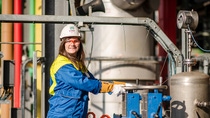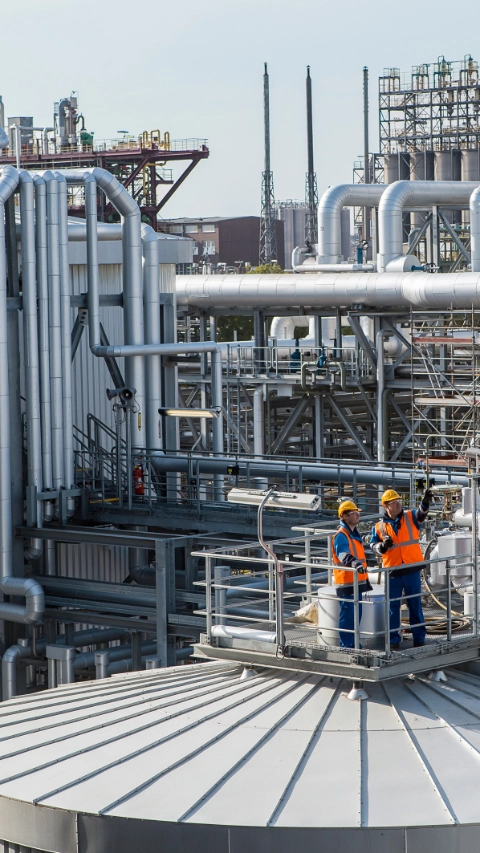Isocyanates and Polyols
Lupranat® ZERO
Climate change is the greatest challenge of our time. That is why we are committed to the European Green Deal and are striving to reach its target of net-zero emissions by 2050. Additionally, by 2030 BASF aims to reduce CO2 emissions by 25 percent compared to 2018. The product carbon footprint (PCF) of each BASF product thus plays an important role and creates the necessary transparency in relation to the associated greenhouse gas emissions.
"Our customers are becoming increasingly concerned about climate protection. By using Lupranat® ZERO, our customers can sustainably reduce their carbon footprint and thus make an active contribution to climate protection while enjoying the same high product quality.”
Our offer
Currently, Lupranat® ZERO is available for the product specification M 70 R, which is used for the production of MDI polyisocyanurate (PIR or polyiso) panels and rigid polyurethane foam fort he thermal insulation of buildings. This is particularly interesting for the construction industry which the respective sector can benefit from it.
Our portfolio
BASF is expanding its portfolio of climate-friendly products such as methylene diphenyl diisocyanate (MDI) and introducing Lupranat® ZERO (net-zero emissions, renewable origin, and renewable energy), the first greenhouse gas-neutral isocyanate. Lupranat® ZERO has a balance sheet cradle-to-gate PCF of zero.


What does the cradle-to-gate mean?
- A cradle-to-gate PCF encompasses all the processes from the extraction of raw materials through the manufacture of precursors and the production of the end product to the point at which it leaves the company.
- A cradle-to-grave PCF encompasses the product’s entire life cycle, including emissions during the use phase and at the end of the product’s life.
Product Carbon Footprint (PCF)
In general, the PCF encompasses the total greenhouse gas emissions caused by a product in the different phases of its life cycle (Cradle to grave). However, the calculation of a PCF covering the entire life cycle of a raw material is impossible due to the fact the same raw material can be used in the production of various products with different ways of processing. Nonetheless, the CO2-emissions that were emitted during the production of the raw material are of vital importance to enable the downstream users to calculate their Product Carbon Footprint. Which is why the PCFs of raw materials are generally calculated and communicated on the basis of Cradle to gate.
For given reasons at BASF, the communicated PCF is based on cradle to gate.
Possible ways to improve the PCF of a given product
One way to improve the PCF of products are production process improvements leading to lower greenhouse gas emissions. In addition to our striving to improve the PCF via process innovations and improvements, we offer our customers a portfolio of products which are based on a Mass Balance approach. In this approach renewable raw materials are used to replace fossil resources. Therefore, a blend of renewable and resources is used in the initial production stages and the renewable resources are attributed to the respective sales products using a certified calculation model. This 3rd party certified model ensures that related to the sold Mass Balance product quantities the corresponding amount of renewable raw materials is added in the very beginning of the production sequence and therefore can be attributed to the Mass Balance product.
Contact:
Pu4sustainability@basf.com
Certified Sustainability
The specific PCF value of Lupranat ZERO M 70 R is certified by TÜV NORD (German technical inspection authority). “We have checked the calculation of the PCF of Lupranat ZERO M 70 R in detail and are now pleased to be able to confirm it for the first time,” says Delia Carls, auditor at TÜV NORD. At the raw material level, certification by “REDcert2 ” is available to our customers. In this way, we guarantee that renewable raw materials have been fed into the Verbund production. As a result, customers and BASF can manufacture a wide range of products in a more sustainable way. This supports us in saving fossil resources and is one step towards our goal of reaching net-zero CO2 emissions by 2050.

What else do we aim to achieve?
Following the successful launch of Lupranat ZERO M 70 R, further variants of the product will be added to the portfolio.
Stay informed with our sustainability newsletter:
Subscribe here.
What else is included in our sustainability promise? BMB, Chemcycled


